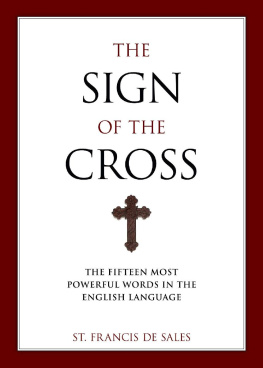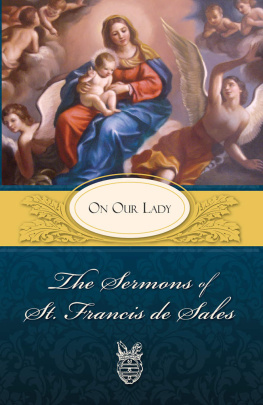St. Francis de Sales - The Sign of the Cross
Here you can read online St. Francis de Sales - The Sign of the Cross full text of the book (entire story) in english for free. Download pdf and epub, get meaning, cover and reviews about this ebook. year: 2013, publisher: Sophia Institute Press, genre: Religion. Description of the work, (preface) as well as reviews are available. Best literature library LitArk.com created for fans of good reading and offers a wide selection of genres:
Romance novel
Science fiction
Adventure
Detective
Science
History
Home and family
Prose
Art
Politics
Computer
Non-fiction
Religion
Business
Children
Humor
Choose a favorite category and find really read worthwhile books. Enjoy immersion in the world of imagination, feel the emotions of the characters or learn something new for yourself, make an fascinating discovery.
- Book:The Sign of the Cross
- Author:
- Publisher:Sophia Institute Press
- Genre:
- Year:2013
- Rating:5 / 5
- Favourites:Add to favourites
- Your mark:
- 100
- 1
- 2
- 3
- 4
- 5
The Sign of the Cross: summary, description and annotation
We offer to read an annotation, description, summary or preface (depends on what the author of the book "The Sign of the Cross" wrote himself). If you haven't found the necessary information about the book — write in the comments, we will try to find it.
St. Francis de Sales: author's other books
Who wrote The Sign of the Cross? Find out the surname, the name of the author of the book and a list of all author's works by series.
The Sign of the Cross — read online for free the complete book (whole text) full work
Below is the text of the book, divided by pages. System saving the place of the last page read, allows you to conveniently read the book "The Sign of the Cross" online for free, without having to search again every time where you left off. Put a bookmark, and you can go to the page where you finished reading at any time.
Font size:
Interval:
Bookmark:
St. Francis de Sales
The Sign of the Cross
The Fifteen Most Powerful Words
in the English Language
Edited and translated
by Christopher O. Blum
SOPHIA INSTITUTE PRESS
Manchester, New Hampshire
The Sign of the Cross: The Fifteen Most Powerful Words in the English Language is a new translation of Defense de lEstendart de la Sainte Croix, from Oeuvres de St. Franois de Sales, dition complte, tome deuxime (Annecy: Nirat, 1892) and includes a new foreword by Christopher Check and a biographical note written by the staff of Sophia Institute Press that was originally published in St. Francis de Saless Thy Will Be Done (Sophia Institute Press, 1995).
Copyright 2013 Sophia Institute Press
Printed in the United States of America
All rights reserved
Cover design by Carolyn McKinney
On the cover: Wooden Cross with Design (8898867)
iStockphoto.com/Jason Deines
No part of this book may be reproduced, stored in a retrieval system, or transmitted in any form, or by any means, electronic, mechanical, photocopying, or otherwise, without the prior written permission of the publisher, except by a reviewer, who may quote brief passages in a review.
Sophia Institute Press
Box 5284, Manchester, NH 03108
1-800-888-9344
www.SophiaInstitute.com
Sophia Institute Press is a registered trademark of Sophia Institute.
Library of Congress Cataloging-in-Publication Data
Francis, de Sales, Saint, 1567-1622.
[Dfense de lestendart de la Sainte Croix. English]
The sign of the cross : the fifteen most powerful words in the English language / translated and edited by Christopher O. Blum.
pages cm
ISBN 978-1-933184-97-5 (alk. paper) eBook ISBN 978-1-622821-68-6
1. Cross, Sign of the. I. Blum, Christopher Olaf, 1969- editor of compilation. II. Title.
BV197.S5F7313 2013
242.72 dc23
2013011705
Contents
Foreword
Catholics who recognize St. Francis de Sales doubtless know, or at least know of, his masterpiece of spiritual direction, Introduction to the Devout Life . Offering a path to sanctity later proclaimed by holy men and women from the Little Flower to Josemara Escriv, St. Francis showed the common man of the Counter-Reformation that his everyday life was not only a gift from God, but also one that he could return to the Divine Giver. In labor and rest, in toil and triumph, in sorrow and joy, the common man could work out his salvation and give glory and honor to God. The business of holiness, he insisted, was not the special preserve of ordained priests and consecrated religious. Every Christian has a role to play in the economy of salvation, a role great or small depending not on the worlds opinion of the grandeur of the undertaking but on something considerably more sublime: the amount of love of God we bring to all that we do.
Three centuries later, in one of the few works that merit mention in the same breath as Introduction to the Devout Life , Father Edward Leen devoted a chapter of his In the Likeness of Christ to this very truth. The secret of life, Leen teaches, is less of a mystery than we make of it. Leave to God the ends, Father Leen counsels. Instead, attend to your motives: Let all your actions be done out of love of Jesus Christ.
Father Leen had before him the example of the freshly ordained St. Francis de Sales.
More than a decade before he penned the Introduction to Devout Life , St. Francis de Saless Christian heart forged in the arsenal of rigorous self-denial and intense study was tested on the best kind of proving grounds, one where human savagery and holy opportunity collided: Le Chablais, 15941598. There, in the words of his biographer, Andr Ravier, S.J., we encounter not Francis de Sales the gentle pastor watching over tender sheep and lambs in the midst of meadow flowers, but instead, Francis de Sales the warrior engaged in missionary combat.
In the sixteenth century, the Chablais was a province in the Duchy of Savoy. Placed by God at the bloody crossroads of France, Italy, and Switzerland, the province was a battleground in the wars spawned by the heresies of that most unpleasant of religious rebels, or stinker, as St. Francis called him in an unguarded moment, John Calvin. The iconoclasts of Geneva rolled through the once bucolic region of the Chablais, leaving behind political turmoil, hundreds of desecrated churches, and a mere remnant perhaps no more than a hundred among twenty-five thousand of terrified and persecuted Catholics holding out hope for a return of the Roman liturgy, the sacraments of the Church, and the joy of Catholic life.
The man who restored the Faith to the Chablais was Francis de Sales. Two years into his priesthood he volunteered for the task. Armed with a Bible and few texts of Bellarmine, and joined only by his cousin, Canon Louis de Sales, Francis left his chapter in Annecy and ventured north.
Bellocs high praise of Thomas More that in the end he acted alone applies no less to Francis de Sales in the Chablais. Indeed, the English martyr of not-too-distant memory may well have been an inspiration to Francis, who, save the fraternity of his cousin, found himself altogether abandoned in his effort. Most painful was the resistance from his own father, the Lord of Boisy, who made every effort to discourage his son and refused to give him the least sum to support his venture. Father, if I did not desire the responsibility, said Francis why should I put on the cassock? On the morning of his departure for the Chablais, September 14, the feast of the Exaltation of the Holy Cross, Franciss father would not even bid his son farewell.
On the edge of the Chablais, the fortress of the Baron dHermance, a nobleman loyal to Rome, served as a beachhead. Each day, Francis and Louis walked the ten miles into the regions capital city, Thonon. There they preached the Catholic Faith to those who would hear. At the end of the day they walked home. To stay overnight in Thonon would have put their lives in danger, and Francis over the next four years would suffer assassination attempts, attacks by wolves, and the privations of winter. The saints unshod feet left bloody footprints in the snow.
More discouraging than physical suffering was the apparent failure of the mission. A year passed, and then another, and then another, and still Francis had but a few converts to show for his efforts. In his correspondence Francis describes preaching Advent sermons to four or five, a number that our Internet-burdened age would judge inefficient, to say the least.
Did St. Francis de Sales yield? Never for a moment.
To the Catholic remnant he brought the sacraments they had so long desired. He slid his tracts defending the Faith under the doors of Thonons citizens, and he treated the citys ranking Calvinist clergy with abundant measures of insight, wit, patience, and good humor. When Louis showed signs of losing hope, Francis smiled and assured him that they had planted so much seed that the harvest would not be far off. In the fourth year, like ears of wheat, the converts came, at first by ones and twos a laborer here and a prominent Calvinist theologian there. Before long Franciss field was flourishing with souls, thousands, brought back to holy Mother Church. As he later described it, the vines were exhaling their perfume. The young priest had brought love to all that he did. He had left the results to God. And God had delivered.
The conversion of the Chablais is one of the great stories of Catholic apologetics, not so much for numbers, staggering as they were, but more for exhibiting the truth that apostolic work absent an interior life focused on Jesus Christ will not bear fruit. Again and again, in a work no man who is serious about apostolic work should fail to read and reread, Soul of the Apostolate , Dom Chautard offers to us the example of Francis de Sales to drive home his point:
Next pageFont size:
Interval:
Bookmark:
Similar books «The Sign of the Cross»
Look at similar books to The Sign of the Cross. We have selected literature similar in name and meaning in the hope of providing readers with more options to find new, interesting, not yet read works.
Discussion, reviews of the book The Sign of the Cross and just readers' own opinions. Leave your comments, write what you think about the work, its meaning or the main characters. Specify what exactly you liked and what you didn't like, and why you think so.











![Saint Francis de Sales [Sales - The Saint Francis de Sales Collection [15 Books]](/uploads/posts/book/266802/thumbs/saint-francis-de-sales-sales-the-saint-francis.jpg)



![Saint Francis de Sales - The Saint Francis de Sales Collection [15 Books]](/uploads/posts/book/161144/thumbs/saint-francis-de-sales-the-saint-francis-de-sales.jpg)